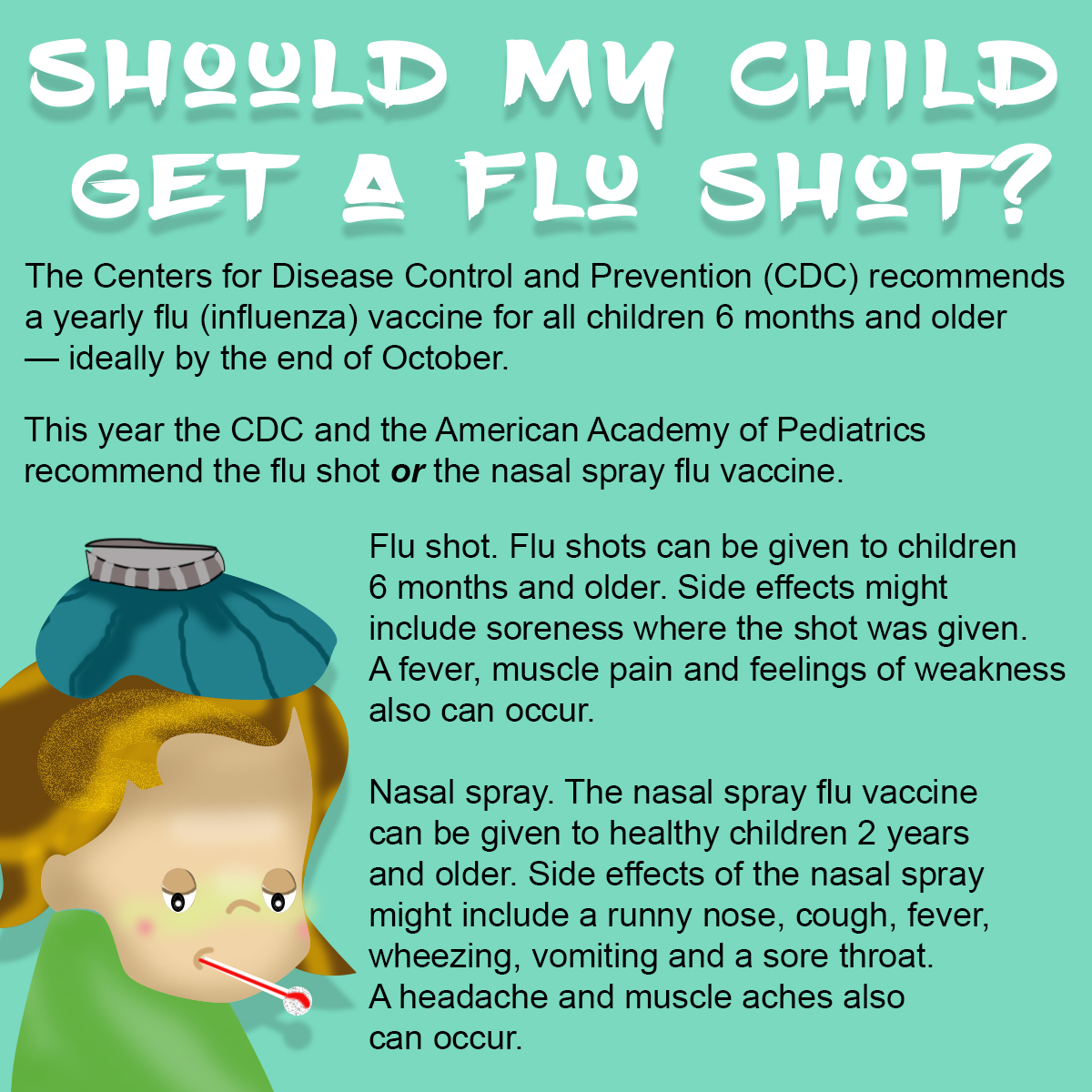by Susannah Wollman
Every year during flu season the question arises. There are passionate answers on both sides of the aisle, so understanding how flu shots can affect you and your children is very important.

Is it safe for everyone?
Every year, hundreds of thousands of people get the influenza virus badly enough to require hospitalization and tens of thousands die from flu. This is unfortunate because the flu vaccine is very safe. Generally speaking, everyone over the age of 6 months should receive a flu vaccine. Here’s who should NOT get a flu shot.
- Children younger than 6 months of age are too young to get a flu shot.
- People with severe, life-threatening allergies to flu vaccine or any ingredient in the vaccine. This might include gelatin, antibiotics, or other ingredients. See Special Considerations Regarding Egg Allergy for more information about egg allergies and flu vaccine.
- If you ever had Guillain-Barré Syndrome (a severe paralyzing illness, also called GBS). Some people with a history of GBS should not get a flu vaccine. Talk to your doctor about your GBS history.
- If you are not feeling well, talk to your doctor about your symptoms.
The nasal spray vaccine is approved for use in healthy non-pregnant individuals, 2 years through 49 years of age. Talk to your doctor to determine which vaccine is more appropriate for you.

Are there risks associated with the flu vaccine?
Yes. As with vaccines of all sorts, there are associated risks. Most of them are mild and not life-threatening. For children, the side effects are similar to those in adults. They include:
- low-grade fever
- muscle aches
- soreness at the injection site.
If you are pregnant, you should still get the flu vaccine. Your immune system changes during pregnancy, leading to an increased risk of severe illness or hospitalization for flu. Also, the antibodies you develop during pregnancy can be passed to your infant through breast milk. The stage of pregnancy is not a factor in deciding whether or not to get the shot (the nasal spray vaccine is not recommended for pregnant women).
However, though the flu vaccine has a strong safety record in pregnant women, you should know that a study done for the 2010-2012 flu seasons did raise some safety concerns. An association between miscarriage and flu vaccination during the preceding 28 days was made by researchers.
Two important things stood out.
- This study only included a small number of women.
- The association was only significant for women who had received the vaccine in the year before for the pandemic H1N1 strain.
The CDC and the American College of Obstetricians and Gynecologists both strongly recommend the flu vaccine for all pregnant women.

Do I need a flu shot every year?
Yes. Here’s why. Each flu season is different from the last. The particular flu strain that happened last year probably won’t be around this year. So every year, the vaccine is tailored to which strain is most likely to cause illness this year. This year (2019 – 2020), quadrivalent vaccines are available that protect against four flu viruses.
When should I get the vaccine?
The manufacturers who make the flu vaccine start shipping it in August. At first, people were told to get the vaccine early. However, the results of a study done recently indicate that the effectiveness of the vaccine wanes over time. Since you want the vaccine to last through the current season, you may not want to get it too early.
Most doctors recommend that you get your flu vaccine for the current season by the end of October before the virus has started spreading in your community. It’s important to remember that it takes 2 weeks for the immunization to take effect.
I’ve heard a lot of scary stories about the vaccine. Are they true?
- The flu vaccine can give you the flu virus.
That is not true. Currently, flu shots are made in one of two ways. The first way is made with an “inactivated” (killed) virus that is no longer contagious. The second way uses only a single gene from a flu virus (rather than the full virus), which produces an immune response but not an infection. - It’s better to get the flu than the vaccine.
Also not true. Flu can be a very serious illness. Since each year’s virus is different than the previous year’s, getting the flu once will not protect you from the next flu virus to come along. In fact, if you have certain chronic health conditions, any flu infection can result in serious complications, hospitalization, or even death, even if you are normally quite healthy. - Someone I know had a severe reaction to the flu vaccine. Doesn’t that mean I will, too?
Many people report some mild reactions to the flu shot. Soreness, redness, tenderness or swelling in the injection site are not uncommon. People can also have a low-grade fever, headache, or muscle aches. If they occur, these reactions are typically noticed within the first few days of getting the flu shot. A blind study revealed that the only difference between people who received flu shots and those who received salt-water shots was a bit more soreness or redness at the injection site among the people who got an actual flu vaccine. - The nasal spray is not as effective as the shot and can cause more side effects.
Actually, the nasal spray recommended for the 2019-2020 season is as effective in approved groups of people as the flu shot. Side effects are generally mild and may include runny nose, wheezing, headache, vomiting, muscle aches, fever, sore throat, and cough. These side effects are considerably less severe than the actual flu virus, and they are usually short-lived. - My friend got a flu shot and still got the flu.
Sometimes people who have been vaccinated do get flu. There are several reasons this may occur. They may have been exposed just before they were vaccinated or even after they’ve been vaccinated but before their immune systems have produced antibodies. It’s possible that the illness they have contracted isn’t actually flu, but another virus that affects the respiratory system. Many viruses are active at the same time and the only one the vaccine protects against is flu. It’s also possible that the specific strain they were vaccinated against isn’t the strain they become exposed to. For more information on the variety of viruses, read this: Influenza (Flu) Viruses.

Do your homework.
No one can decide for you if you should get a flu shot. However, the overwhelming evidence in favor of protection that being vaccinated gives should help you make the choice. Even if you, yourself decide not to be vaccinated, be aware that a 2017 study showed that getting a flu shot significantly reduces a child’s risk of dying from the flu virus.

If you choose to get your flu shot this year walk-in to America’s ER 24/7 for $25 flu shots with no wait! Find your nearest America’s ER.
Resources:
- https://www.cdc.gov/flu/protect/vaccine/qa_vacpregnant.htm
- https://www.cdc.gov/flu/highrisk/index.htm
- https://www.sciencedirect.com/science/article/pii/S0264410X17308666?via%3Dihub
- https://www.ncbi.nlm.nih.gov/pubmed/28039340
- Carolyn Bridges et al. (2000). Effectiveness and cost-benefit of influenza vaccination of healthy working adults: A randomized, controlled study. New England Journal of Medicine. 333(14): 889-893.

